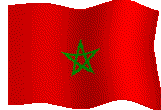 |
25 Feb: Todra Gorge & Merzouga |
 |
25 Feb: Todra Gorge & Merzouga |
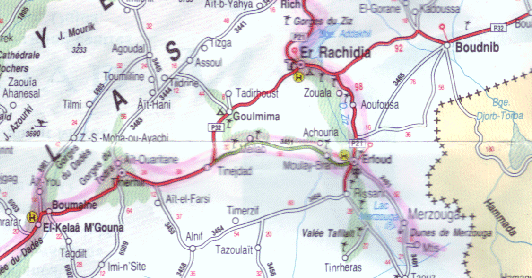 |
|
|
Infidel ! Don't Take My Picture !
We set off early again, in the freezing cold of the Atlas. Drove out of the Dades Gorge, and although we passed the same route on the way to Boumalne du Gorges, the view was different from an opposite direction. The whole landscape looked as though it had flown straight out from a science fiction work - so unreal, so beautiful. Of course, reality is tough for the locals - are there jobs for them here ? With a growing population and limited arable land, most young people probably cannot find jobs locally. No wonder the shanty towns of Casablanca and Fes are growing at an alarming speed, and that bodies of the less successful illegal immigrants are often washed ashore onto the shores of southern Spain or northern Morocco.
After Boumalne du Gorges, the flat desertscape resumes. We passed
Imiter, a tiny godforsaken village which was the home of an anti-French
guerilla fighter. He held out against the French for 25 years, only
to be betrayed by his brother-in-law, and killed. Another tale of
love, heroism and betrayal.
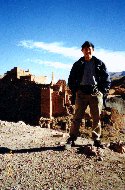 |
 |
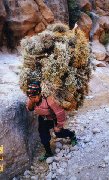 |
|
|
|
|
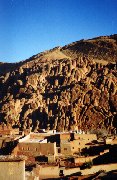 |
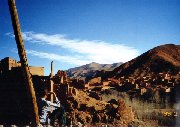 |
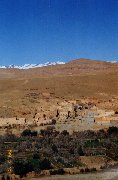 |
|
|
|
|
Tinerhir, a picturesque oasis town with luxuriant palmeraies was next. We stopped at a cliffside overlooking this beautiful town. As usual, awaiting us were quite a few touts, all wearing blue robes - disguising as Tuaregs seem to be a national pastime in Morocco's tourist towns. Many pretend to be Tuaregs - the rugged, legendary blue man of the Sahara - to attract tourists to take photos together, at a price of course. They are known as the blue man due to the bright indigo dye they use for their robes, which turn their skin slightly blue-ish. Anyway, I did persuade one to take a photo for free.
After Tinerhir, we detoured to Todra Gorge, a steep, narrow gorge with a little clear stream running through it. It reminded me of Petra in Jordan. Here, I bumped into the young Californian who introduced me to this tour in Marrakesh. Apparently, a number of my travel companions were here because of him as well. Perhaps, Hotel Ali should pay him a commission. He's here for rock climbing, a growing activity for travellers in the gorge.
Further up the gorge, we came across a bus with passengers sitting on
top. Tried taking a picture as the bus approached me. On the
front seat was a fierce Frankenstein lookalike who screamed at me in Arabic,
and I turned my camera away. Only snapped a picture when it was some
distance behind… what a pity. Another photographic opportunity soon
came in the form of some ladies carrying wood and hay which stacked as
high as their height. Tough work ! Wanted to take their pictures
but they turned away. I understand them… we would have behaved similarly
if someone come to our homes in London, New York or Singapore, and wanted
to take our pictures for their personal albums.
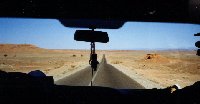 |
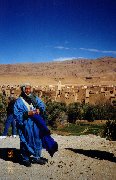 |
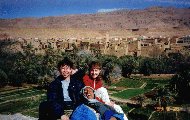 |
|
|
|
|
Not far ahead, two women were doing their laundry by the river, while a fat man, presumably their husband, was resting under a palm tree. Our Tunisian friend asked him, "Hey, why are you resting there when your women are working hard ?"
"Me ? I have to protect the household, and maintain order in the family. It's hard work, and anyway, it's the woman's duty to grow the crops and wash the clothes. If I do all these, everybody will call me a woman !" the master of the house replied.
Turning to his Austrian wife, our Tunisian friend said, "See how lucky
you are !"
The English Patient: Adventure Among The Great Sand Dunes
We had lunch in a gorge restaurant, after which we sped towards the Tafilat Oasis. Tafilat - this was the centre of the Kharijite emirate of Sijilmassa, a heretical Shiite sect that ruled the region in the 8th and 9th centuries. The Kharijites, meaning "secessionists", were firm believers of religious piety and meritocracy, but often resort to violent means to resolve political issues. Ali, son-in-law of the Prophet, was assassinated by the Kharijites and the action partly led to the schism of Islam into Sunnis and Shiites. In the 17th century, arose from this remote region was the Alaouite Dynasty that continues to rule Morocco today. More recently, the Tuareg nomads have settled in this inhospitable region, and these brave warriors, like those in the High Atlas, had put up very fierce resistance against French rule, and were only suppressed in 1932.
Today, tourists come here for the great sand dunes of Merzouga. We drove straight into Erfoud, the last "big" town before the sand dunes. This is a new administrative centre built by the French, with banks and shops selling anything that the modern tourist desires. We exclaimed with astonishment when we found Polo and Danish cookies at a shop. Where else in the world is truly isolated ?
We stocked up with the most important commodity in the desert, water,
and then proceeded towards Merzouga. As we sped across the rocky
waste southeast of Erfoud, a mild sand storm began, and we could hardly
see the horizon. Soon, our driver drove off the paved road into the
desert. We wondered where our driver was bringing us. I prayed
that he knew his way around, as one desert bush looked the same to me as
another. We felt a little relieved when we passed a French-run auberge
in the middle of nowhere. The driver told us that 2 out of 3 members
of a French family - a couple and their daughter - died last year when
the auberge owner told them that they wouldn't need any Tuareg guide, as
this erg wasn't that large. So they rented a four wheel drive, and
soon found themselves getting lost in the desert, going round and round
the same place. The lack of any landmark in the desert meant that
people can get lost even in a small confined area. They ran out of
petrol and water, and the father then set off on foot to seek help, leaving
his wife and daughter in the 4WD. He was never found again, and a
rescue party soon found his wife dead from dehydration and the daughter
weak but alive. Chilling story and certainly wasn't helpful in assuring
us of our safety.
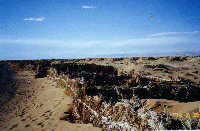
Soon, we saw the erg, huge, drifting sand dunes that characterise the
popular imagination of the Sahara. We became silent, gawking at this
spectacular sight. Before long, we arrived at an establishment called
Café Yasmine, which has a basic hotel and restaurant (too grand
a name for it…), and also acts as a launching point for expeditions into
the Erg Chebbi. Here, our driver handed us over to the local Tuareg
guide, Ahmad and company - "Now you enter the territory of the Tuaregs,
and only they know the desert well," he said. We unloaded only the
most essential items and then set off on camels.
We were organised into three groups. Our camels were tied one to another, with the Tuareg guide pulling the first camel in front. I was on the last camel of my "caravan group", and my camel - let's call him Yahya (John in Arabic) - was an extremely stubborn beast. Can't really blame it - who enjoys being tied to another chap, and then forced to carry around really un-cool creatures with weak spines and no humps. Whenever possible, Yahya struggled to slow down the group, dragging its feet, or tried to turn away in a different direction. Everytime it did that, the Tuareg kicked it. Yahya's compatriot in front, Hussein, wasn't exactly obedient either. At one point, Hussein actually managed to set its rope free from the camel in front, and tried to escape to freedom. Hussein's rider, this Frenchman who had just joined our group, shouted to alert our Tuareg guide. Dumb Yahya, fortunately, wasn't cooperative either, as it refused to move, meaning that Hussein can't move too, as it was tied to Yahya at the back. And so the Tuareg guide came, tied Hussein tightly to the camel in front, and gave him a hard kick. Hussein cried loudly - poor creature! In fact, our Tuareg guide told us to kick the camels hard to discipline them, but I simply couldn't make myself do that. One thing is sure: I definitely can't be a Certified Camel Owner. My secret ambition of joining a caravan expedition to Timbuktu was now at risk !
We rode for about an hour - the erg was one of the most amazing thing I have ever seen in my life - endless horizon of sand dunes, many of which are as high as five-, six- or god-knows-how-many storey buildings - for simply there are no reference points for comparisons. There is hardly any vegetation, or even boulders - just soft, fine sand everywhere. No landmarks - everything looks the same to me, not to mention that it was turning dark very quickly. For the first time in my travels, I felt totally worthless and directionless. My life was in the control of these desert tribesmen, who presumably knew where we were heading. I am simply overwhelmed by the desert. Soon, the sky turned darker, and the only noise was that of the winds, which appeared to get stronger. The air was filled with sand and I could hardly see more than five camels ahead of me. A minor sand-storm was brewing, or perhaps storm was too strong a word, for clearly the Tuareg warriors did not display any sense of anxiety.
I felt relieved when suddenly, in the middle of nowhere, a bedouin tent came into sight. It nestled there, at the foot of a giant sand dune, maybe ten storeys high, maybe more (again a wild guess). We were to spend the night here. The tourists unloaded, and sat down to chat, while Ahmad and his kinsmen prepared dinner for us. We spoke about travels, politics - the massacres in Algeria, the crazy Colonel Kaddafi, the corrupt Arab kingdoms - and more.
It was a great evening, except for an arrogant American who expressed
surprise that I actually like my country (Singapore). "I wouldn't
want to start a political debate with you," he said - even before I could
respond to his unprovoked remark. When our guides asked where I was
from, he volunteered that I was "from China", his reasons being both Singapore
and China are located in Asia. I was tempted to tell him he's Cuban
or Mexican, simply because USA and these countries are located on the same
continent. The world would be a better place if people stop imposing
their values and perceptions of other countries.
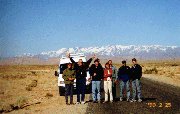 |
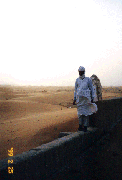 |
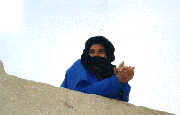 |
|
|
|
|
Dinner's ready - great tajines prepared in the most rudimentary of conditions! And Ahmad entertained us with his amazing ability to speak six languages, and his endless jokes. And yes, Ahmad cycles 30 kilometers south of this spot to visit his wife in the village - how unromantic, a fellow traveller commented. Well, most of us have expected a more colourful version - e.g., riding the camels across the desert.
There were more serious moments too - Ahmad told us about his love for the old way of life of the Tuaregs - they were caravan traders who travelled through the Sahara - Morocco, Algeria, Mali, Niger, Libya - borders meant nothing to them. They were simply doing what their ancestors had been doing - bringing the tropical produce of the Guinea coast and the south to the Mediterranean, and the crafts of the Magreb to the sub-Saharan Hausa city states and so on. But then came the Algerian-Moroccan quarrel over Algerian support for the Polisario guerrillas in Western Sahara. The borders were shut, electric fences were built and desert roads were mined. The borders have become a reality, and a way of life has come to an end. To survive, these proud desert warrior-traders become tour or expedition guides, occupation so unworthy of these masters of the wild. But that's how things go nowadays…
![]() 26 Feb: Merzouga - Erfoud - Er Rachidia: Transit Adventures
26 Feb: Merzouga - Erfoud - Er Rachidia: Transit Adventures